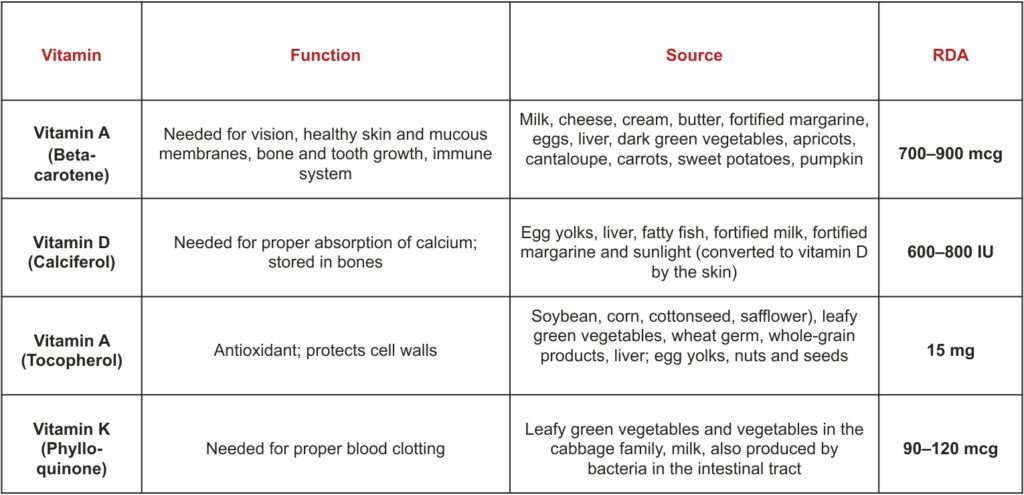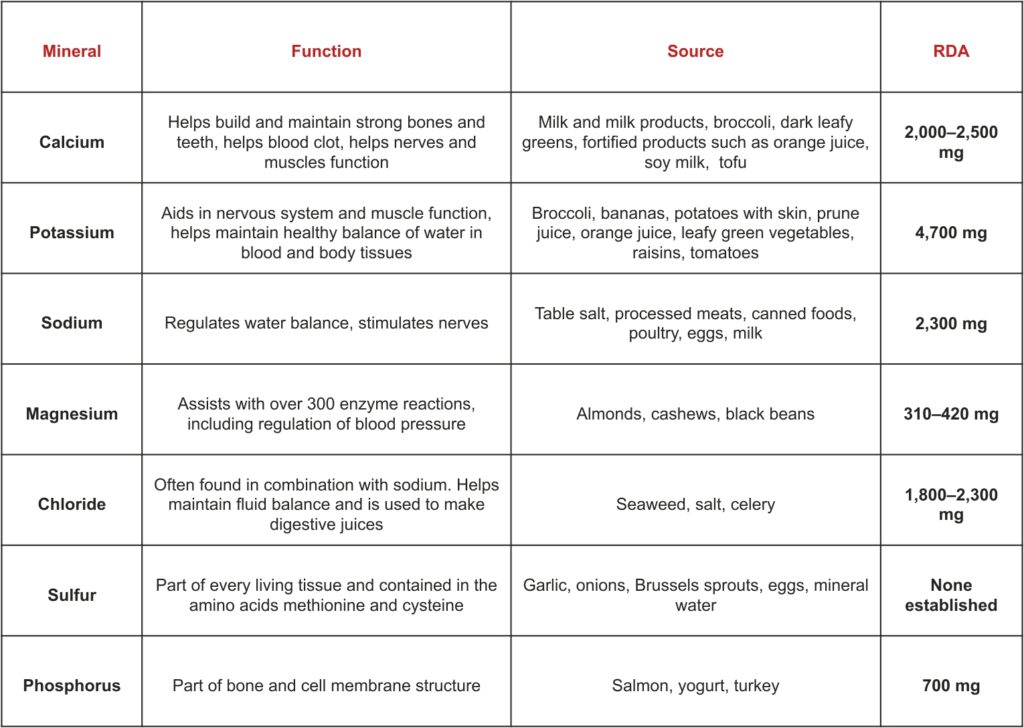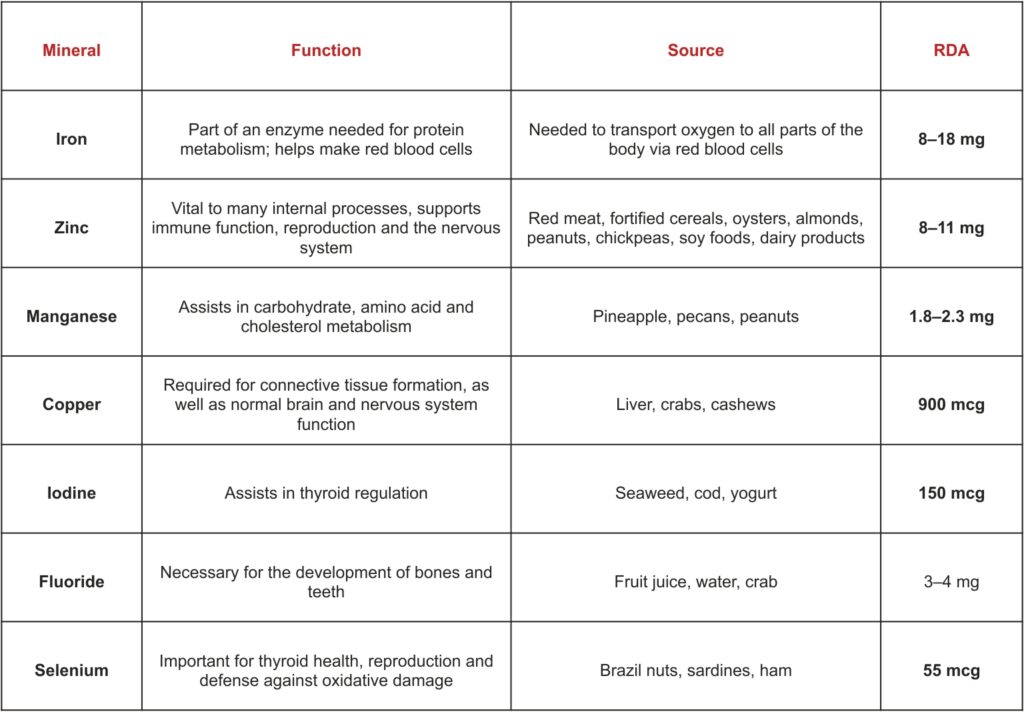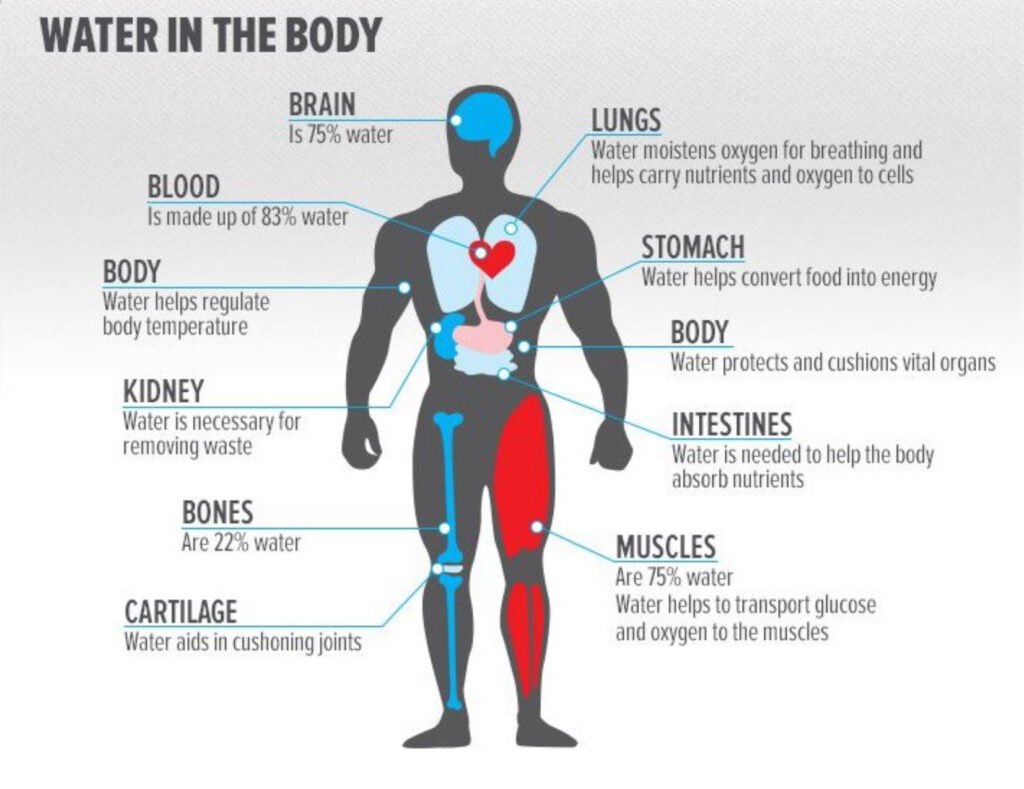Micronutrients (Micros)
Micronutrients are one of the major groups of nutrients your body needs. Your body needs smaller amounts of micronutrients relative to macronutrients. That’s why they’re labeled “micros.” They include vitamins and minerals. Humans must obtain micronutrients from food since your body cannot produce vitamins and minerals — for the most part. That’s why they’re also referred to as essential nutrients. Vitamins are necessary for energy production, immune function, blood clotting and other functions. Meanwhile, minerals play an important role in growth, bone health, fluid balance and several other processes. Vitamins are organic compounds made by plants and animals which can be broken down by heat, acid or air. On the other hand, minerals are inorganic, exist in soil or water and cannot be broken down. The micronutrient content of each food is different, so it’s best to eat a variety of foods to get enough vitamins and minerals.
Vitamins and minerals can be divided into four categories: water-soluble vitamins, fat-soluble vitamins, macrominerals and trace minerals. Regardless of type, vitamins and minerals are absorbed in similar ways in your body and interact in many processes.
Water-Soluble Vitamins
Most vitamins dissolve in water and are therefore known as water-soluble. They’re not easily stored in your body and get flushed out with urine when consumed in excess. While each water-soluble vitamin has a unique role, their functions are related. For example, most B vitamins act as coenzymes that help trigger important chemical reactions. A lot of these reactions are necessary for energy production. The most common water-soluble vitamins are: Vit B-1, Vit B-2,Vit B-3,Vit B-5,Vit B-6, Vit B-7, Vit B-9, Vit B-12, Folic Acid and Vit C.

Fat-Soluble Vitamins
Fat-soluble vitamins do not dissolve in water. They’re best absorbed when consumed alongside a source of fat. After consumption, fat-soluble vitamins are stored in your liver and fatty tissues for future use. The names and functions of fat-soluble vitamins are: Vit A, Vit D, Vit E & Vit K.

Macrominerals
Macrominerals are needed in larger amounts than trace minerals in order to perform their specific roles in your body.

Trace Minerals
Trace minerals are needed in smaller amounts than macrominerals but still enable important functions in your body.

Water (Hydration)
This amazing substance is involved in every bodily function known to man. Your vital fluid blood is comprised of ninety percent water. And we all know that our blood is responsible for transporting nutrients and energy to working muscles and then transporting metabolic waste away from tissues. A reduction in water means more concentrated blood. A loss of only five percent body water results in a ten percent loss of water from your blood. The thicker the blood, the more susceptible your body is to clotting, and the less efficient it becomes at delivering oxygen to your brain and muscles. It also becomes harder to transport substances to and from your various tissues. Temperature regulation is controlled by water. If you do not have sufficient amounts of water in your body, cooling cannot take place. Water lubricates joints and helps your digestive system. Water is also responsible for the actions involved in energy production. If your kidneys do not have adequate water available to them, your liver is forced to detoxify toxins.

And when your liver is called upon to do this, other functions performed by your liver are less effective, including the metabolism of food products.
Water helps you recover from your workouts, aids in fat-based fueling of muscles and provides for storage of water inside your cells. When you become dehydrated, all of these functions become less effective and your performance levels lower. Water contributes to energy storage by being stored alongside glycogen. If you do not drink enough water to facilitate this, extra glucose remains in your bloodstream until it reaches your liver. Then the glucose is stored as fat. You can actually get fatter when you do not consume adequate amounts of water.
If you are dieting, drink plenty of water so your liver can effectively metabolize body fat. And when you are carbohydrate loading, drink water often so glucose can become stored as glycogen. Active people need more water than inactive people do. A reduction in as little four to five percent body water can result in a drop in physical performance as great as twenty to thirty percent. It is recommended that you consume plenty of water on a daily basis, twenty minutes before any athletic event and following high carbohydrate meals. Do not wait until you are thirsty to drink water. By the time your body reaches that point, you are already deficient in this vital fluid.

When you consider that our muscles are made up of nearly 70% to 80% water, it is easy to see why fluid replacement is so important! Dehydration upsets the natural balance of fluids in the body and can lead to serious problems, including difficulties associated with heart function and temperature-regulation.
Fluid replacement is as important for the average fitness enthusiast as it is for the well-trained athlete. With so much riding on balanced body fluids, researchers are always seeking the most effective way to keep our bodies well-hydrated and functioning at peak condition.

Dr Saranjeet Singh
Fitness & Sports Medicine Specialist
Lucknow








very well written sir!
A very well written article highlighting the importance of proper hydration.